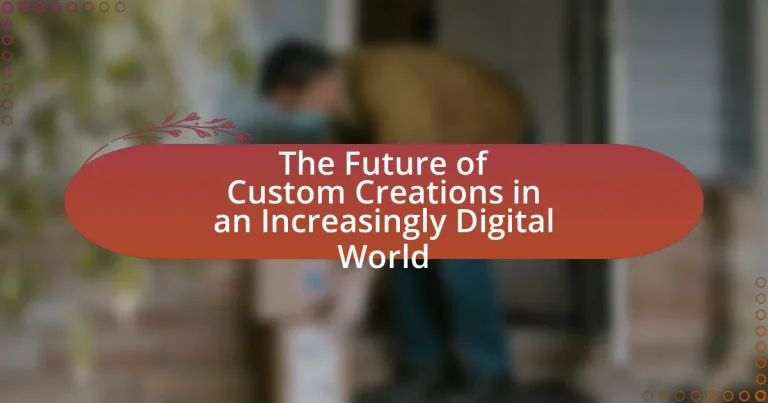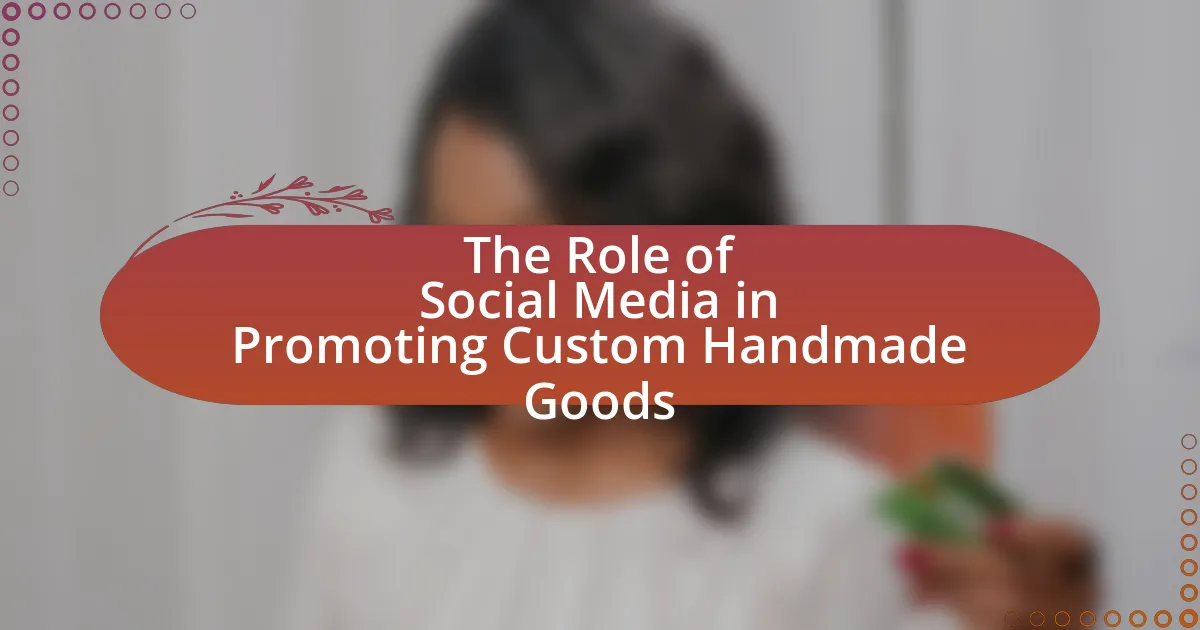The article focuses on the future of custom creations in an increasingly digital world, highlighting the role of advanced technologies such as artificial intelligence, 3D printing, and augmented reality in enhancing personalization and accessibility. It discusses how digital platforms facilitate collaboration between creators and consumers, leading to tailored products that meet individual preferences. Additionally, the article examines the implications of digital customization for consumer satisfaction and loyalty, the challenges faced by consumers in navigating customization options, and the adaptation of various industries to these trends. It also addresses the importance of sustainability in custom creations and outlines best practices for businesses to succeed in this evolving landscape.
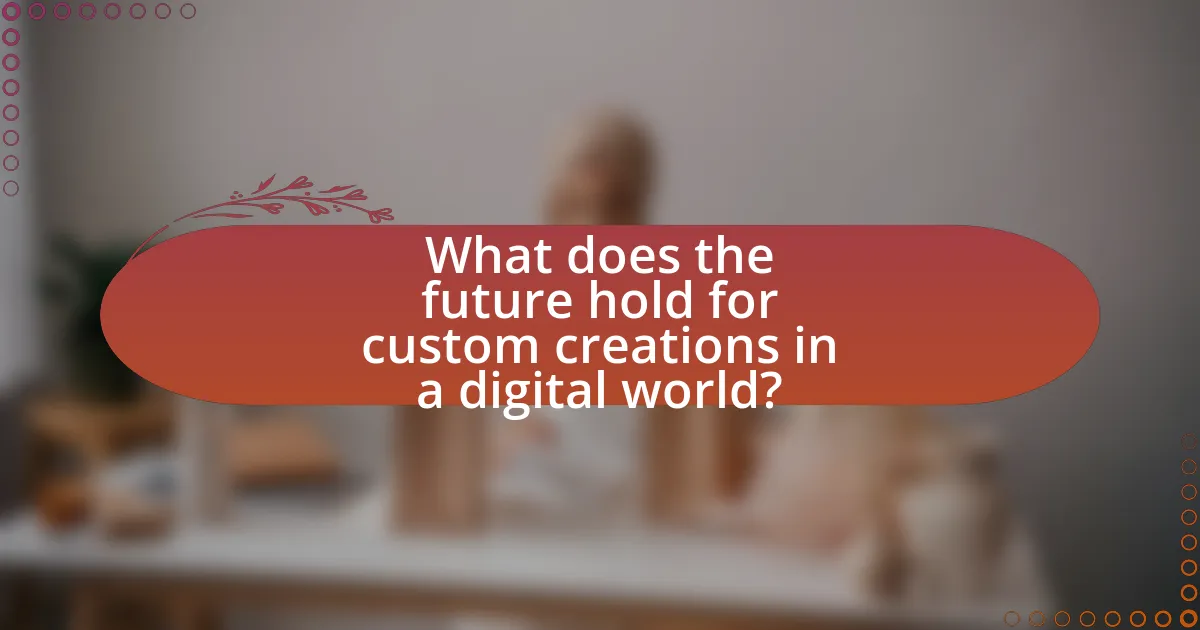
What does the future hold for custom creations in a digital world?
The future of custom creations in a digital world is characterized by increased personalization and accessibility through advanced technologies. Innovations such as artificial intelligence and 3D printing are enabling creators to produce tailored products efficiently, meeting individual consumer preferences. For instance, a report by McKinsey & Company highlights that 70% of consumers express a preference for personalized experiences, indicating a strong market demand for custom solutions. As digital platforms evolve, they will facilitate greater collaboration between creators and consumers, further enhancing the customization process.
How is digital technology transforming custom creation processes?
Digital technology is transforming custom creation processes by enabling greater personalization and efficiency through advanced tools and platforms. Technologies such as 3D printing, computer-aided design (CAD), and artificial intelligence (AI) allow creators to design and produce customized products rapidly and with high precision. For instance, 3D printing has reduced production time and costs, allowing for on-demand manufacturing that caters to individual customer specifications. Additionally, AI algorithms analyze consumer preferences to suggest tailored designs, enhancing the customization experience. This shift not only streamlines workflows but also empowers consumers to engage in the creation process, leading to products that better meet their unique needs.
What tools and technologies are driving innovation in custom creations?
Artificial intelligence, 3D printing, and augmented reality are driving innovation in custom creations. Artificial intelligence enhances design processes by enabling personalized recommendations and automating complex tasks, which increases efficiency and creativity. 3D printing allows for rapid prototyping and the production of unique, customized products with intricate designs that traditional manufacturing cannot achieve. Augmented reality provides immersive experiences for customers, allowing them to visualize and interact with custom products before purchase, thereby improving customer satisfaction and engagement. These technologies collectively transform the landscape of custom creations, making them more accessible and tailored to individual preferences.
How do digital platforms enhance collaboration in custom creation?
Digital platforms enhance collaboration in custom creation by providing tools that facilitate real-time communication, resource sharing, and project management among diverse teams. These platforms enable users to collaborate seamlessly, regardless of geographical barriers, by offering features such as instant messaging, video conferencing, and shared workspaces. For instance, platforms like Slack and Trello allow team members to track progress, assign tasks, and share files efficiently, which accelerates the creative process. Research indicates that companies utilizing collaborative digital tools experience a 20-30% increase in productivity, demonstrating the effectiveness of these platforms in fostering teamwork and innovation in custom creation.
What are the implications of digital customization for consumers?
Digital customization significantly enhances consumer experiences by allowing personalized products and services tailored to individual preferences. This personalization leads to increased consumer satisfaction, as studies show that 80% of consumers are more likely to purchase from brands that offer personalized experiences. Additionally, digital customization fosters brand loyalty, with 70% of consumers expressing a preference for brands that recognize their unique needs. Furthermore, it enables consumers to engage more deeply with products, as they can influence design and functionality, resulting in a sense of ownership and connection to the product.
How does personalization impact consumer satisfaction and loyalty?
Personalization significantly enhances consumer satisfaction and loyalty by creating tailored experiences that meet individual preferences and needs. When consumers receive personalized recommendations or services, they feel valued and understood, which fosters a stronger emotional connection to the brand. Research indicates that 80% of consumers are more likely to make a purchase when brands offer personalized experiences, demonstrating the direct correlation between personalization and increased consumer engagement. Furthermore, personalized marketing strategies can lead to higher retention rates, as satisfied customers are more likely to remain loyal to brands that cater to their specific desires and behaviors.
What challenges do consumers face in navigating digital custom creation options?
Consumers face several challenges in navigating digital custom creation options, including complexity, lack of guidance, and overwhelming choices. The complexity arises from intricate interfaces and numerous customization features that can confuse users. Additionally, many platforms do not provide adequate guidance or tutorials, leaving consumers unsure of how to effectively utilize the tools available. Furthermore, the sheer volume of options can lead to decision fatigue, making it difficult for consumers to make informed choices. Research indicates that 60% of consumers abandon customization processes due to these overwhelming choices, highlighting the need for more user-friendly designs and clearer instructions in digital custom creation platforms.
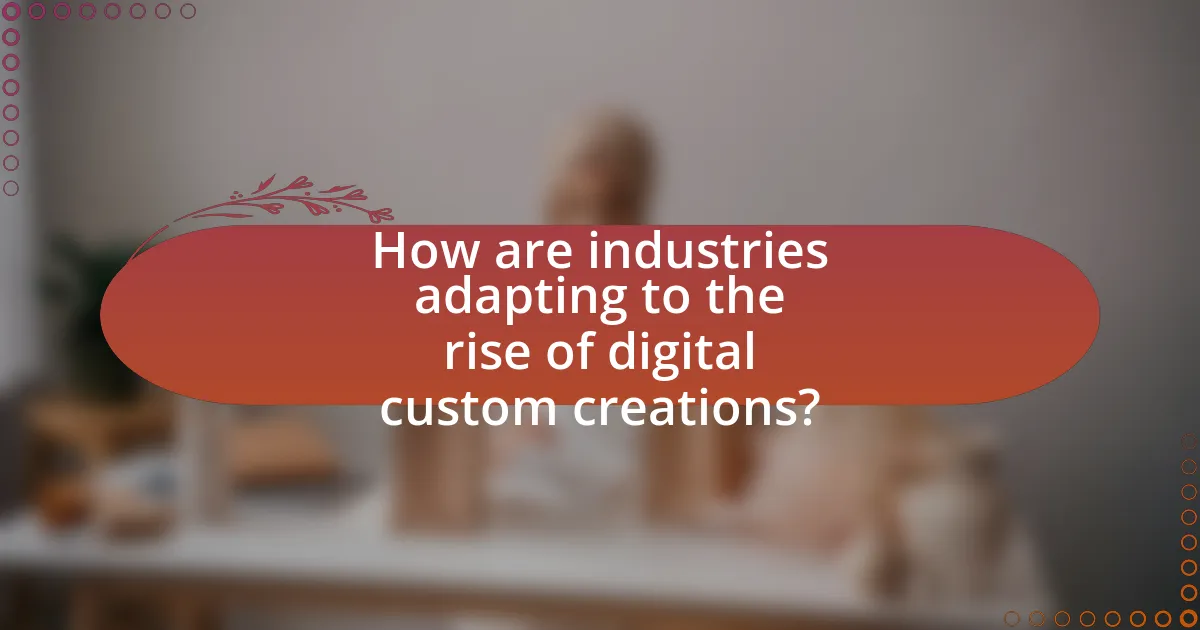
How are industries adapting to the rise of digital custom creations?
Industries are adapting to the rise of digital custom creations by implementing advanced technologies such as 3D printing, artificial intelligence, and data analytics to enhance personalization and efficiency. For instance, the fashion industry utilizes AI algorithms to analyze consumer preferences and create tailored designs, while manufacturers employ 3D printing to produce customized products on demand, reducing waste and inventory costs. According to a report by McKinsey, companies that embrace digital customization can achieve a 20% increase in customer satisfaction and a 30% reduction in production costs, demonstrating the tangible benefits of this adaptation.
Which sectors are leading the way in digital customization?
The sectors leading the way in digital customization are e-commerce, fashion, automotive, and healthcare. E-commerce platforms utilize advanced algorithms to offer personalized shopping experiences, with companies like Amazon reporting that 35% of their revenue comes from personalized recommendations. The fashion industry is increasingly adopting customization technologies, with brands like Nike allowing customers to design their own shoes, reflecting a growing trend towards individualized products. In the automotive sector, manufacturers like Tesla offer customizable vehicle features, enhancing user experience and satisfaction. Lastly, the healthcare sector is leveraging digital customization through personalized medicine, where treatments are tailored to individual genetic profiles, improving patient outcomes.
What role does e-commerce play in the future of custom creations?
E-commerce is pivotal in shaping the future of custom creations by providing a global platform for creators to showcase and sell personalized products. This digital marketplace enables consumers to easily access unique, tailor-made items, fostering a direct connection between creators and buyers. According to a report by Statista, the global e-commerce market is projected to reach $6.3 trillion by 2024, indicating a significant growth opportunity for custom creation businesses. Furthermore, advancements in technology, such as 3D printing and AI-driven design tools, are increasingly integrated into e-commerce platforms, allowing for more efficient production and customization processes. This synergy between e-commerce and custom creations not only enhances consumer experience but also drives innovation in product offerings.
How are traditional industries integrating digital custom solutions?
Traditional industries are integrating digital custom solutions by adopting technologies such as cloud computing, IoT, and AI to enhance operational efficiency and customer engagement. For instance, manufacturers are utilizing IoT devices to gather real-time data, which allows for personalized production processes tailored to specific customer needs. A report by McKinsey highlights that companies implementing digital solutions can achieve up to a 30% increase in productivity. Additionally, retailers are leveraging AI-driven analytics to customize marketing strategies and improve customer experiences, demonstrating a significant shift towards data-driven decision-making in traditional sectors.
What are the potential risks associated with digital custom creations?
Digital custom creations pose several potential risks, including intellectual property theft, data privacy concerns, and quality control issues. Intellectual property theft occurs when original designs or concepts are copied without permission, leading to financial losses for creators. Data privacy concerns arise when personal information is collected during the customization process, potentially exposing users to data breaches or misuse. Quality control issues can result from the reliance on automated systems, which may produce subpar products that do not meet customer expectations. These risks highlight the need for robust protections and standards in the digital custom creation landscape.
How can data privacy concerns affect consumer trust in custom creations?
Data privacy concerns significantly undermine consumer trust in custom creations. When consumers perceive that their personal data may be mishandled or exploited, they become hesitant to engage with brands offering personalized products or services. A survey by the Pew Research Center found that 79% of Americans are concerned about how their data is being used by companies, indicating a widespread apprehension that can directly impact purchasing decisions. This lack of trust can lead to decreased customer loyalty and reduced willingness to share information necessary for creating tailored experiences, ultimately hindering the growth of businesses in the custom creation sector.
What measures can be taken to mitigate risks in digital customization?
To mitigate risks in digital customization, organizations should implement robust data security protocols, including encryption and access controls. These measures protect sensitive customer information from breaches, which have increased by 17% in recent years according to the Identity Theft Resource Center. Additionally, conducting regular audits and compliance checks ensures adherence to regulations like GDPR, minimizing legal risks. Training employees on cybersecurity best practices further reduces the likelihood of human error, which is a significant factor in 95% of data breaches. By adopting these strategies, businesses can effectively safeguard their digital customization processes.
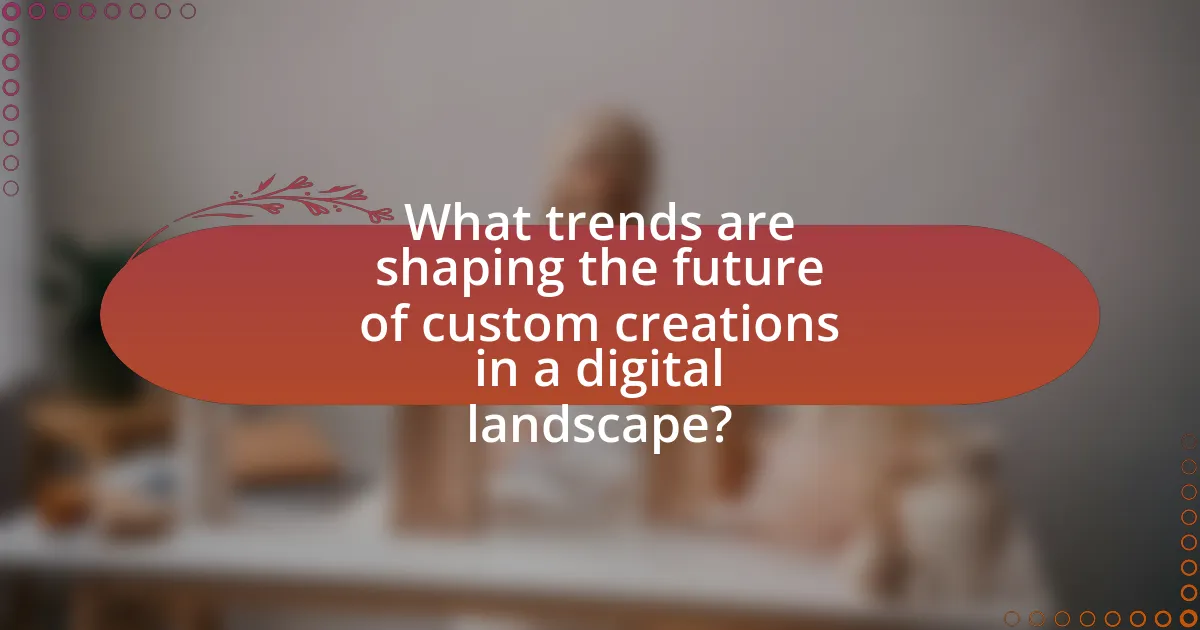
What trends are shaping the future of custom creations in a digital landscape?
The future of custom creations in a digital landscape is being shaped by trends such as personalization, artificial intelligence, and 3D printing. Personalization allows consumers to tailor products to their specific preferences, enhancing user engagement and satisfaction. Artificial intelligence streamlines the design process by analyzing consumer data to predict trends and automate customization, leading to more efficient production. Additionally, 3D printing technology enables rapid prototyping and on-demand manufacturing, reducing waste and allowing for intricate designs that were previously unattainable. These trends collectively indicate a shift towards more user-centric and efficient creation processes in the digital realm.
How is artificial intelligence influencing custom creation?
Artificial intelligence is significantly influencing custom creation by enabling personalized design and production processes. AI algorithms analyze consumer preferences and behaviors, allowing businesses to tailor products to individual needs efficiently. For instance, companies like Nike utilize AI-driven platforms to offer customized footwear options based on user input, enhancing customer satisfaction and engagement. Furthermore, a report from McKinsey highlights that AI can reduce product development time by up to 50%, demonstrating its impact on accelerating the customization process.
What are the benefits of using AI in the customization process?
The benefits of using AI in the customization process include enhanced personalization, increased efficiency, and improved customer satisfaction. AI algorithms analyze vast amounts of data to understand individual preferences, allowing businesses to tailor products and services to meet specific customer needs. For instance, a study by McKinsey & Company found that personalization can lead to a 10-30% increase in revenue for companies that effectively implement AI-driven customization strategies. Additionally, AI streamlines the customization process by automating repetitive tasks, reducing time and costs associated with manual customization efforts. This efficiency not only accelerates production but also enables businesses to respond quickly to market trends, further enhancing customer satisfaction.
How does AI enhance user experience in custom creation platforms?
AI enhances user experience in custom creation platforms by providing personalized recommendations and automating design processes. These platforms utilize machine learning algorithms to analyze user preferences and behaviors, enabling them to suggest tailored options that align with individual tastes. For instance, AI can analyze past user interactions to recommend specific styles or features, significantly reducing the time users spend searching for suitable designs. Additionally, AI-driven tools can automate repetitive tasks, such as resizing images or adjusting layouts, allowing users to focus on more creative aspects of their projects. This combination of personalization and automation leads to a more efficient and satisfying user experience, as evidenced by studies showing that platforms employing AI see increased user engagement and satisfaction rates.
What role does sustainability play in the future of custom creations?
Sustainability is crucial in shaping the future of custom creations by driving demand for environmentally responsible practices and materials. As consumers increasingly prioritize eco-friendly products, businesses in the custom creation sector are adopting sustainable methods to meet these expectations. For instance, a report from McKinsey & Company indicates that 66% of global consumers are willing to pay more for sustainable brands, highlighting the market shift towards sustainability. This trend compels companies to innovate in their design and production processes, utilizing recycled materials and reducing waste, thereby aligning with both consumer values and regulatory pressures.
How are companies incorporating sustainable practices in digital customization?
Companies are incorporating sustainable practices in digital customization by utilizing eco-friendly materials, optimizing production processes, and implementing waste reduction strategies. For instance, brands like Adidas have introduced 3D printing technology to create shoes with less material waste, while companies such as Unmade allow customers to design garments that are produced on-demand, minimizing overproduction. Additionally, many firms are adopting digital tools that enable them to analyze and reduce their carbon footprint throughout the customization process, ensuring that sustainability is integrated into every step of production.
What consumer trends are driving demand for sustainable custom products?
Consumer trends driving demand for sustainable custom products include increasing environmental awareness, a preference for personalized experiences, and the rise of ethical consumerism. Environmental awareness has surged, with 66% of global consumers willing to pay more for sustainable brands, according to a Nielsen report. Additionally, consumers increasingly seek personalized products that reflect their values, leading to a demand for custom solutions that are both unique and eco-friendly. Ethical consumerism is also on the rise, with 73% of millennials willing to pay extra for sustainable offerings, highlighting a shift towards supporting brands that prioritize sustainability. These trends collectively indicate a significant market shift towards sustainable custom products.
What best practices should businesses follow for successful digital custom creations?
Businesses should prioritize user-centered design, agile development, and data-driven decision-making for successful digital custom creations. User-centered design ensures that products meet customer needs, enhancing satisfaction and engagement. Agile development allows for iterative improvements based on user feedback, leading to more adaptable and relevant solutions. Data-driven decision-making leverages analytics to inform design choices and optimize user experiences, resulting in higher conversion rates and customer retention. According to a study by McKinsey, companies that adopt data-driven strategies are 23 times more likely to acquire customers and 6 times more likely to retain them, underscoring the importance of these best practices.
